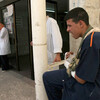
According to international aid organisations, a five week health workers’ strike in the West Bank has prompted some Palestinians to threaten medical staff into treating them. “The strike has had a huge impact on health services. People are knocking on the doors of doctors who are at home and offering to pay for treatment,” said David, Shearer, head of the United Nation’s Office for the Coordination of Humanitarian Affairs (OCHA) in Jerusalem. “People are also threatening medical staff to try to get themselves treated - and it’s going to get worse. We don’t have any numbers on how many people may actually have died, or how many babies may have died in childbirth, as they are not being registered.” Read more about West Bank patients grow increasingly desperate for medical treatment
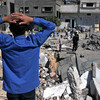
The number of Palestinian children who have been killed so far this year in the West Bank and the Gaza Strip almost doubles the number killed for the whole of 2005, according to the United Nations Children’s Fund (UNICEF). Many of the children died after being shot by Israeli troops during military operations or were killed in Israeli air strikes on houses. On Thursday, 13-year-old Suhaib Kadiah became the 92nd Palestinian child to be killed this year when she was shot dead by Israeli troops during an incursion into the Khan Younis area of Gaza. Read more about Number of Palestinian children killed doubles
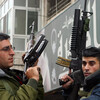
The number of people killed in crimes in occupied Palestinian territories (oPt) has increased exponentially in 2006 compared to the previous years, according to statistics released Wednesday by the Ramallah-based Palestinian Independent Commission for Citizens’ Rights (PICCR). “This year has witnessed a significant rise in the number of insecurity victims,” said Ma’moun Iteily of the PICCR’s department which documents cases of insecurity and human rights violations. According to the PICCR statistics, 270 people were killed in the oPt by 10 October. By contrast, 93 people were killed in 2004 and 176 in 2005. Read more about Victims of insecurity increase in oPt
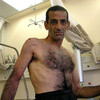
Business owners from four Arab villages in the north of Israel are waiting to see whether a court will grant them the same compensation as their Jewish Israeli counterparts for damage done during the recent war between Israel and the armed wing of Lebanon’s political party Hezbollah. Arab organisations in Israel say the Israeli-Hezbollah conflict [12 July to 14 August] may have hit Arab communities harder because they were generally poor to start with. The villages of Arab al-Aramshe, Fasuta, Ma’alia and Jesh, suffered serious damage during the conflict, but have been denied the full compensation package awarded to neighbouring Jewish villages. Read more about Arab villages want equal compensation
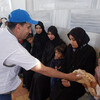
The Syrian Organisation for Human Rights in Syria (SOHR) said on Sunday that it was deeply concerned about “the deteriorating humanitarian conditions” of the Palestinians who are stranded on the Iraqi-Syrian border and who include about 150 children. “Their lives in Iraq are in real danger because of lack of security,” SOHR told IRIN. Among the stranded Palestinians is the Saeed family, which arrived at the Tanaf checkpoint on the border some five months ago after fleeing Iraq. As Palestinians, their lives in Iraq were in danger after they were targeted by unknown militants. Read more about Stranded Palestinians should be allowed into the country, say UNHCR and rights group
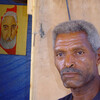
Canada has accepted to host 46 Palestinian refugees from Iraq who have been languishing at al-Rweished refugee camp, some 250 km east Amman, for the past three years, said Robert Breen, the United Nation’s refugee agency (UNHCR) Representative in Jordan. “Representatives of the Canadian government interviewed 150 Palestinian refugees at the fenced camp a few months ago but accepted one third of them,” said Breen, who hoped a third country would be found to accept the remaining group before a deadline set by Jordan to close the camp expires. Read more about Canada to resettle 46 Palestinian refugees

A report by the Palestinian Ministry of Health says that pregnant Palestinian women are often prevented by Israeli forces from reaching hospitals to receive appropriate medical attention, causing many miscarriages and the deaths of some women. Since the beginning of the second Intifada, a Palestinian uprising against Israeli military occupation, in September 2000, 68 pregnant Palestinian women gave birth at Israeli checkpoints, leading to 34 miscarriages and the deaths of four women, according to the Health Ministry’s September report. Thoraya Obaid, Executive Director of the United Nations Population Fund (UNFPA), said these figures underline the need to put an end to the agony of pregnant Palestinian women held at Israeli checkpoints. Read more about Pregnant Palestinians give birth at Israeli checkpoints
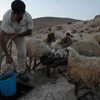
Environmentalists and public health specialists are warning of escalating health problems due to a growing freshwater deficit and declining water quality in the Gaza Strip. Nahed Abu Dayyia, an ecologist with the Palestinian Water Authority (PWA), says water pollution in Gaza is primarily caused by high salinity and high nitrate concentrations in groundwater. The Gaza Strip, bordering Israel and Egypt, has a population of more than 1.4 million, one of the most densely populated areas in the world. “Insufficient sanitation conditions and the absence of sewage conveyance systems pose serious threats to public health and are the major causes of environmental degradation,” Dayyia said. Read more about Freshwater shortage leads to health problems in Gaza Strip
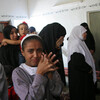
A survey by a West Bank research company has revealed that the level of “severe depression” in the population of the Palestinian territory had increased by 21 percent over the past year to 77 percent. The survey, conducted by Near East Consulting company, questioned residents of Gaza, the West Bank and East Jerusalem on their general state of being. Much higher levels of depression were found in respondents living in extreme poverty, where the figure stands at 83 percent. Only 13 percent of respondents in the oPt said they were “very content”, a decline of 12 percent from 2005. Read more about Depression increasing due to conflict and poverty

An ongoing economic boycott and intermittent border closures have created humanitarian problems for Gaza’s residents, including a deteriorating agricultural sector, the United Nations and the Palestinian Authority (PA) said. The PA’s Minister of Agriculture, Mohammed al-Agha, told IRIN that “Israel’s security measures had cost Palestinian farmers thousands of acres of farmland and nearly US $1.2 billion since the start of the second intifada [Palestinian uprising against Israeli occupation] in September 2000.” Israel says it was necessary to clear land to prevent cross-border terrorist attacks. Read more about Palestinian agricultural losses top US $1 billion









